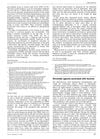TLDR Stopping isoniazid can reverse hair loss caused by the drug.
In a case report from 2011, a 30-year-old woman undergoing treatment for pulmonary tuberculosis with a regimen including isoniazid experienced hair loss after one month of therapy. Upon discontinuation of isoniazid, while continuing the other drugs, her hair loss decreased and regrowth was observed within two months. This case supports previous findings that isoniazid, along with other antituberculosis drugs such as thiacetazone and ethionamide, can be associated with alopecia. Drug-induced alopecia is generally reversible upon withdrawal of the offending drug. The case emphasizes the importance of physicians being aware of this potential side effect so they can manage patient compliance and provide reassurance if hair loss occurs during treatment.
16 citations
,
December 2001 in “The Journal of Dermatology” A woman recovered from hair loss and skin eruptions after stopping a tuberculosis drug and using steroids.
 9 citations
,
February 1996 in “Lancet”
9 citations
,
February 1996 in “Lancet” Some tuberculosis drugs may cause hair loss, but hair might regrow after treatment or changing the drugs.
 147 citations
,
April 1994 in “Drug Safety”
147 citations
,
April 1994 in “Drug Safety” Some drugs can cause hair loss or increase hair growth, but these effects are usually reversible when the drug is stopped.
 November 2022 in “The Indian journal of chest diseases & allied sciences”
November 2022 in “The Indian journal of chest diseases & allied sciences” Isoniazid can rarely cause hair loss, which is reversible after stopping the drug.
 4 citations
,
April 2014 in “Journal of Pharmacology and Pharmacotherapeutics”
4 citations
,
April 2014 in “Journal of Pharmacology and Pharmacotherapeutics” The boy's hair loss was caused by the tuberculosis drug isoniazid but grew back after stopping the medication.
 9 citations
,
February 1996 in “Lancet”
9 citations
,
February 1996 in “Lancet” Some tuberculosis drugs may cause hair loss, but hair might regrow after treatment or changing the drugs.
 33 citations
,
February 1996 in “Lancet”
33 citations
,
February 1996 in “Lancet” Losartan can cause temporary loss of taste.
 13 citations
,
July 2001 in “International Journal of Dermatology”
13 citations
,
July 2001 in “International Journal of Dermatology” Inflammation and Demodex mites might contribute to hair loss, and targeting them could help treat it.






